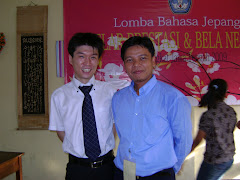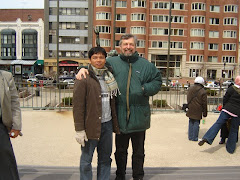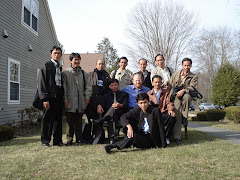Dear students,
Please submit your assignment in my blog!
GOOD LUCK!
Wednesday, July 22, 2009
Kalimat Sederhana
If you want to say, “I am a Japanese person” in formal Japanese, you could say, “わたしは にほんじんです” (watashiwa nihonjindes). However, how do you say the opposite of that? How do you say, “I am not a Japanese person” in formal Japanese? You can say this in Japanese as, “わたしは にほんじんじゃありません” (watashiwa nihonjin ja arimasen).
As you see in this sentence, the ja arimasen (じゃありません) has replaced the des (です). In addition, the ja arimasen (じゃありません) comes right after the noun. You can form the negative form of any sentence that has a noun. I’ll talk about negating sentences with adjectives in another post.
Just so you know, jaa arimasen (じゃありません) is the contracted form of negating a sentence. The uncontracted form is dewa (でわ). Using the example above, I am not a Japanese person is, “わたしは にほんじんでわありません” (watashiwa nihonjin dewa arimasen).
Subjects can be dropped in Japanese. Therefore, the sentence, “I am a Japanese person” can have the “I” dropped if it’s obvious that you’re doing the talking. Simply saying, “にほんじんです” is adequate enough. This is especially true when you’re asking people questions in Japanese. You can ask, “Are you a Japanese person?” by asking, “にほんじんですか” (nihonjin deska). The Japanese word for “you” in Japanese is “anata” (あなた). You’re free to include anata (あなた) as the subject of the sentence when you’re asking someone a question, but it’s a bit redundant.
Des (です) is a flexible verb. You can use des (です) to say, “am”, “are”, and “is”. For example the sentence, “Misora is ten years old” in Japanese is “みそらは じゅっさいです“. The same goes for the negative form of des (です) which is jaarimasen (じゃありません). One last thing, before I go, des (です) and jaarimasen (じゃありません) is in the formal, present tense. I’ll write another post on the past tense as well.
One last note, the particle は in わたしは にほんじんでわありません and other sentences, is pronounced as wa, not ha. は is also a subject marking particle. However, since subjects can be dropped, this particle can also be dropped.
As you see in this sentence, the ja arimasen (じゃありません) has replaced the des (です). In addition, the ja arimasen (じゃありません) comes right after the noun. You can form the negative form of any sentence that has a noun. I’ll talk about negating sentences with adjectives in another post.
Just so you know, jaa arimasen (じゃありません) is the contracted form of negating a sentence. The uncontracted form is dewa (でわ). Using the example above, I am not a Japanese person is, “わたしは にほんじんでわありません” (watashiwa nihonjin dewa arimasen).
Subjects can be dropped in Japanese. Therefore, the sentence, “I am a Japanese person” can have the “I” dropped if it’s obvious that you’re doing the talking. Simply saying, “にほんじんです” is adequate enough. This is especially true when you’re asking people questions in Japanese. You can ask, “Are you a Japanese person?” by asking, “にほんじんですか” (nihonjin deska). The Japanese word for “you” in Japanese is “anata” (あなた). You’re free to include anata (あなた) as the subject of the sentence when you’re asking someone a question, but it’s a bit redundant.
Des (です) is a flexible verb. You can use des (です) to say, “am”, “are”, and “is”. For example the sentence, “Misora is ten years old” in Japanese is “みそらは じゅっさいです“. The same goes for the negative form of des (です) which is jaarimasen (じゃありません). One last thing, before I go, des (です) and jaarimasen (じゃありません) is in the formal, present tense. I’ll write another post on the past tense as well.
One last note, the particle は in わたしは にほんじんでわありません and other sentences, is pronounced as wa, not ha. は is also a subject marking particle. However, since subjects can be dropped, this particle can also be dropped.
Classroom Vocabs
school - gakko (がっこう)
student - gakusee (がくせい)
teacher - sensee (せんせい)
class - kurasu (クラス)
class - jugyoo (じゅきょう)
blackboard - kokuban (こくばん)
book - hon (ほん)
dictionary - jisho (じしょ)
homework - shukudai (しゅくだい)
pencil - enpitsu (えんぴつ)
pen - pen (ペン)
question - shitsumon (しつもん)
answer - kotae (こたえ)
eraser - keshigomu (けしゴム)
desk - tsukue (つくえ)
chair - isu (いす)
student - gakusee (がくせい)
teacher - sensee (せんせい)
class - kurasu (クラス)
class - jugyoo (じゅきょう)
blackboard - kokuban (こくばん)
book - hon (ほん)
dictionary - jisho (じしょ)
homework - shukudai (しゅくだい)
pencil - enpitsu (えんぴつ)
pen - pen (ペン)
question - shitsumon (しつもん)
answer - kotae (こたえ)
eraser - keshigomu (けしゴム)
desk - tsukue (つくえ)
chair - isu (いす)
Tuesday, July 14, 2009
Warna dalam Bahasa Jepang
I’m going to list the colors in Japanese. I’ll also list them in the kanji and hiragana/katakana.
black - Kuro (くろ)(黒)
blue - Ao (あお)(青)
light blue - mizuiro (みずいろ)(水色)
brown - Chairo (ちゃいろ)(茶色)
golden - kiniro (きんいろ)(金色)
red - Aka (あか)(赤)
white - Shiro (しろ)(白)
pink - Momoiro (ももいろ)(桃色)
pink - pinku (ピンク)
orange - daidaiiro (だいだいいろ)(橙色)
green - midori (みどり)(緑)
light green - kimidori (黄緑)
yellow - kiiro (きいろ)(黄色)
purple - murasaki (むらさき)(紫)
grey - haiiro (はいいろ)(灰色)
grey - nezu (ねず)
black - Kuro (くろ)(黒)
blue - Ao (あお)(青)
light blue - mizuiro (みずいろ)(水色)
brown - Chairo (ちゃいろ)(茶色)
golden - kiniro (きんいろ)(金色)
red - Aka (あか)(赤)
white - Shiro (しろ)(白)
pink - Momoiro (ももいろ)(桃色)
pink - pinku (ピンク)
orange - daidaiiro (だいだいいろ)(橙色)
green - midori (みどり)(緑)
light green - kimidori (黄緑)
yellow - kiiro (きいろ)(黄色)
purple - murasaki (むらさき)(紫)
grey - haiiro (はいいろ)(灰色)
grey - nezu (ねず)
Friday, July 10, 2009
Tugas Bahasa Inggris UJP
Questions number 41 to 50, do it in your answer sheet!.
41. Give your opinion (agree or disagree) to the following case and tell your reason.
Children are not allowed to have hand phone.
A. (+)...............................
B. ( - ) .............................
42. Give suggestions on the following situations.
A. Your mother will go out, but it’s rather cloudy.
What is your suggestion?
…………………………………………………………………..
B. It’s very hot in this room.
What is your suggestion?
…………………………………………………………………...
C. Your friend found that his work is boring.
What is your suggestion?
……………………………………………………………………
43. You are inviting your friend to have dinner with you. Please complete
this dialog!
A: . . . . . . . . ……………. . . . . . ?
B: . . . . ………. . . Where will we have dinner? (Accept the invitation)
A: At “LEZAT” Restaurant.
44. Respond the statement bellow using the expressions to convince other.
A. Sanny : I’m afraid I won’t pass the promotion test.
Nina : I assure you . . . . . . . . . . . . . . . . . .
B. Tonny : I’m not confident about joining band festival.
Ardy :I believe . . . . . . . . . . . .. . . . . . . . . . . .
45. Complete the sentences below using must or had to.
A.We . . . . submit the assignment yesterday.
B.This package is very important I . . . . . deliver it soon.
C.Your shoes are very dirty.
You . . . . . clean them.
46. Change the following sentences into passive voice!
A.Valentino Rosy has won MOTO GP race eight times.
…………………………………………………………….
B.Manchester United defeated Arsenal last week.
……………………………………………………………..
C.FIFA will hold World Cup 2010 in South Africa.
……………………………………………………………..
47. Put the verb in the brackets into the correct form of conditional sentence
type II.
A.If you (not come) to my party, I (feel) disappointed.
B.If I (hungry), I (have) to find something to eat.
48. Arrange the following jumbled instructions!
A.Now, the rice is ready to be served.
B.Then, boil and cool it the slowly for about 20 minutes until there
is no more water.
C.Well, let me tell you the steps of cooking rice.
D.Next put the rice with some water in a pot.
E.After that, put the rice to the simmer and steam it about 45 minutes.
F.First, wash some rice in cold water.
…………………………………………………………………..
…………………………………………………………………..
…………………………………………………………………..
49. What would you say to compliment or congratulate other people
to this situation?
Your Father got a promotion to be Sales Manager in his office.
You : . . . . . . . . . . . . . . . . . . . . . .
Your Father :. . . . . . . . . . . . . . . . . . . . . .
50. Arrange these words into good sentences!
A.am – at – say – I – the – can – how – moment – delighted – I.
B.for – the – years – graph – five – shows – last – sales – our – the .
Please send your answers via my blog.
Good Luck
Mr. N
41. Give your opinion (agree or disagree) to the following case and tell your reason.
Children are not allowed to have hand phone.
A. (+)...............................
B. ( - ) .............................
42. Give suggestions on the following situations.
A. Your mother will go out, but it’s rather cloudy.
What is your suggestion?
…………………………………………………………………..
B. It’s very hot in this room.
What is your suggestion?
…………………………………………………………………...
C. Your friend found that his work is boring.
What is your suggestion?
……………………………………………………………………
43. You are inviting your friend to have dinner with you. Please complete
this dialog!
A: . . . . . . . . ……………. . . . . . ?
B: . . . . ………. . . Where will we have dinner? (Accept the invitation)
A: At “LEZAT” Restaurant.
44. Respond the statement bellow using the expressions to convince other.
A. Sanny : I’m afraid I won’t pass the promotion test.
Nina : I assure you . . . . . . . . . . . . . . . . . .
B. Tonny : I’m not confident about joining band festival.
Ardy :I believe . . . . . . . . . . . .. . . . . . . . . . . .
45. Complete the sentences below using must or had to.
A.We . . . . submit the assignment yesterday.
B.This package is very important I . . . . . deliver it soon.
C.Your shoes are very dirty.
You . . . . . clean them.
46. Change the following sentences into passive voice!
A.Valentino Rosy has won MOTO GP race eight times.
…………………………………………………………….
B.Manchester United defeated Arsenal last week.
……………………………………………………………..
C.FIFA will hold World Cup 2010 in South Africa.
……………………………………………………………..
47. Put the verb in the brackets into the correct form of conditional sentence
type II.
A.If you (not come) to my party, I (feel) disappointed.
B.If I (hungry), I (have) to find something to eat.
48. Arrange the following jumbled instructions!
A.Now, the rice is ready to be served.
B.Then, boil and cool it the slowly for about 20 minutes until there
is no more water.
C.Well, let me tell you the steps of cooking rice.
D.Next put the rice with some water in a pot.
E.After that, put the rice to the simmer and steam it about 45 minutes.
F.First, wash some rice in cold water.
…………………………………………………………………..
…………………………………………………………………..
…………………………………………………………………..
49. What would you say to compliment or congratulate other people
to this situation?
Your Father got a promotion to be Sales Manager in his office.
You : . . . . . . . . . . . . . . . . . . . . . .
Your Father :. . . . . . . . . . . . . . . . . . . . . .
50. Arrange these words into good sentences!
A.am – at – say – I – the – can – how – moment – delighted – I.
B.for – the – years – graph – five – shows – last – sales – our – the .
Please send your answers via my blog.
Good Luck
Mr. N
Wednesday, July 8, 2009
Woro-Woro utuk UJPers
Dear UJPers in Yogya,
Please kindly send me your e-mail address as soon as possible because I will give you assignment of English. It is a must so do it accordingly.
Mr. N
Please kindly send me your e-mail address as soon as possible because I will give you assignment of English. It is a must so do it accordingly.
Mr. N
Vegetable Vocabulary
Here is a vocabulary list containing some items you’ll probably see in a Japanese grocery store.
やさい - vegetable
たまねぎ - onion
トマト - tomato
ブロッコリー - brocolli
レタス - lettuce
きゅうり - cucumber
ポテト - potato
にんじん - carrot
まめ - bean
ほうれんそう - spinach
だいこん - radish
ズッキーニ - zucchini
ししとう - green pepper
わかめ - seaweed
やさい - vegetable
たまねぎ - onion
トマト - tomato
ブロッコリー - brocolli
レタス - lettuce
きゅうり - cucumber
ポテト - potato
にんじん - carrot
まめ - bean
ほうれんそう - spinach
だいこん - radish
ズッキーニ - zucchini
ししとう - green pepper
わかめ - seaweed
Friday, July 3, 2009
Restaurant Food Vocabulary
You may some of these items on a menyuu (メニュー) or menu dining in a Japanese restaurant.
スパゲッテイ - (supagetti) spaghetti
カレー - (karee) curry
そば - (soba) buck wheat noodles (usually served cold)
うどん - (udon) thick white noodles (usually served ward)
サンドイッチ - (sandoicchi) sandwich
アイスクリーム - (aisukuriimu) ice cream
ラーメン - (raamen) ramen noodles
ハンバーガー - (hanbaagaa) hamburger
コーヒー - (koohii) coffee
コーラ - (coora) cola
サラダ - (sarada) salad
おちゃ - (ocha) tea
ジュース - (juusu) juice
ミルク - (miruku) milk
スパゲッテイ - (supagetti) spaghetti
カレー - (karee) curry
そば - (soba) buck wheat noodles (usually served cold)
うどん - (udon) thick white noodles (usually served ward)
サンドイッチ - (sandoicchi) sandwich
アイスクリーム - (aisukuriimu) ice cream
ラーメン - (raamen) ramen noodles
ハンバーガー - (hanbaagaa) hamburger
コーヒー - (koohii) coffee
コーラ - (coora) cola
サラダ - (sarada) salad
おちゃ - (ocha) tea
ジュース - (juusu) juice
ミルク - (miruku) milk
Subscribe to:
Comments (Atom)













